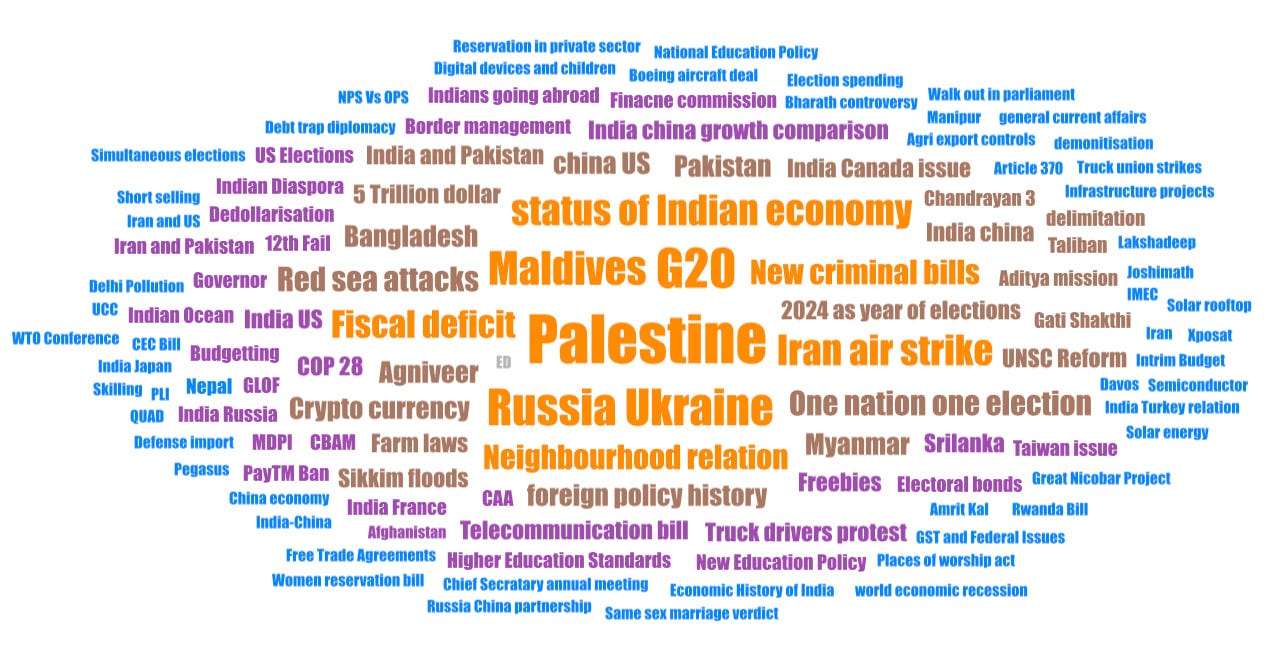How to prepare current affairs for UPSC Interview?
There is a discernible pattern in current affairs questions posed to candidates. They are mostly based on International Relations and Economy. Controversial topics are generally avoided.
There are six types of questions in the UPSC interview. Accordingly, questions brainstormed by the aspirant for the interview can be put into these six buckets.
Profile-Based
a. State-based
b. Profession/Education-based
c. Interest-based
General Awareness
a. Current Happenings related to the profile
b. General Studies questions (e.g., how to eradicate poverty)
c. Current Affairs Questions
The first four categories closely align with the Detailed Application Form (DAF). These are personal and can only be tackled through DAF-based brainstorming and focused reading.
It is less rewarding to focus too much on General Studies questions (5th category) because the subject matter is very vast. Moreover, these are some of the questions that can be tackled with Prelims and Mains knowledge.
When it comes to the sixth category, one needs to read the newspaper on a daily basis to stay updated. However, what to focus more on from the newspaper?
I will answer it with the content analysis of interview transcripts from Jan 2nd to Feb 17th. There were 180 available transcripts during this period.
To ensure that these questions are purely triggered based on current events, questions based on profiles have been kept away from the analysis. For example, questions on semiconductors asked to an electrical engineer are not counted.
Moreover, General Studies questions are also kept outside of the analysis. Questions on evergreen issues like how to protect the environment, how to promote EV, and applications of Artificial intelligence are not counted as current affairs questions.
To set a broad time-frame for current events, a two-year frame has been set. Therefore, questions based on events that happened prior to 2021 have not been included in the analysis.
It is found to have 260 distinct occurrences of current affairs questions among these transcripts. The distribution of the topics can be seen in the word cloud given here.
In the word cloud, the thickness of the topic represents the level of frequency of that particular topic in the interview. The Palestine issue is the most repeated topic with 14 occurrences. The topics listed with light blue color have only one occurrence.
The content analysis shows that there is a discernible pattern in current affairs questions posed to candidates. They are mostly based on International Relations and Economy. Controversial topics are generally avoided. Most recent events generally tend to have higher chances of occurrence.
Is this pattern consistent across years?
I had done the same research in the 2023 transcripts, and the findings are given below.
As you can see, IR and Economy questions have been asked consistently in these two years. It shows a distinct and predictable pattern at least with respect to current affairs questions.
What is the weightage of current affairs questions in an interview?
Current affairs questions generally tend to have lesser weightage compared to all the other five listed categories. Usually, two or three random current affairs questions are posed to the candidate on average.
However, current affairs questions based on the profile (the fourth category) almost dominate most of the interview transcripts. It underlines the fact that DAF-based study (especially based on state and education/work background) remains the most critical area for the UPSC interview.
Even though random current affairs appear less relevant, not answering these can cast a poor impression on the candidate. Therefore, one should focus on those themes that are most repeated in International relations+economy and read newspapers on a daily basis at least one month before their interview. Lead IAS Interview Bulletins can also be a complementary source to build content and perspectives.




